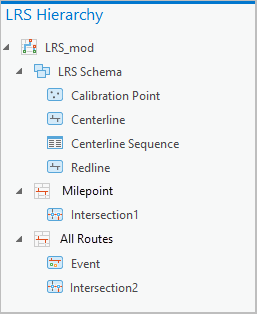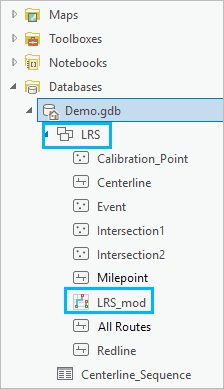Available with Location Referencing license.
A linear referencing system (LRS) dataset is a feature dataset containing all the LRS feature classes.
In ArcGIS Pro you can view the hierarchy in an LRS dataset to determine which types of networks exist in your LRS and which events are associated with each network.
View the LRS hierarchy from the Contents pane
You can view the LRS hierarchy from the Contents pane using the following steps.
- In your ArcGIS Pro project, choose the map that has the LRS feature layer.
The Contents pane appears with the layers in display.
- In the Contents pane, click to choose any feature layer from your LRS dataset.
You can choose any of the feature layers that are members of the LRS dataset (calibration point, centerline, event, intersection, network, or redline).
- Click the Location Referencing tab on the ArcGIS Pro ribbon.
- Click the LRS Hierarchy button
 in the Tools group on the Location Referencing tab.
in the Tools group on the Location Referencing tab. Tip:
If the button is not active, the feature layer you chose is not a member of the LRS dataset. You must choose a valid feature layer in the Contents pane to make this button active.
The LRS Hierarchy pane appears. The LRS (LRS_mod) is the root of the hierarchy.
The LRS Schema
 node has the minimum schema feature classes and the centerline sequence table, while the network nodes show the network, event, and intersection feature classes.
node has the minimum schema feature classes and the centerline sequence table, while the network nodes show the network, event, and intersection feature classes.
- Optionally, right-click any entity in the LRS hierarchy to view its properties or to add it to a new or current map.
You can access properties for the calibration point, centerline, event, intersection, network, or redline feature classes, as well as properties for the centerline sequence table.
View the LRS hierarchy from the Catalog pane
The LRS dataset appears in the Catalog pane as the LRS folder in the geodatabase node. This folder contains all the members of the dataset.
You can view the LRS hierarchy from the Catalog pane using the following steps:
- In your ArcGIS Pro project, open the Catalog pane.
- In the Catalog pane, expand the geodatabase node and expand the feature dataset.
The LRS hierarchy appears in the LRS dataset using the name of the LRS (LRS_mod in this example). If an LRS dataset is not present in the LRS, the LRS hierarchy does not appear. Run the Modify LRS tool to update your LRS.

- Right-click any of the feature layers that are members of the LRS dataset and choose LRS Hierarchy.
The LRS Hierarchy pane appears with the LRS name (LRS_mod in this example) as root.
The LRS Schema node has the minimum schema feature classes and the centerline sequence table, while the network nodes show the network, event, and intersection feature classes.

- Optionally, right-click any entity in the LRS hierarchy to view its properties or to add it to a new or current map.
You can access properties for the calibration point, centerline, event, intersection, network, or redline feature classes, as well as properties for the centerline sequence table.